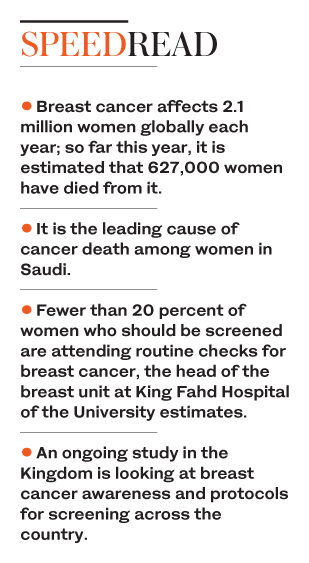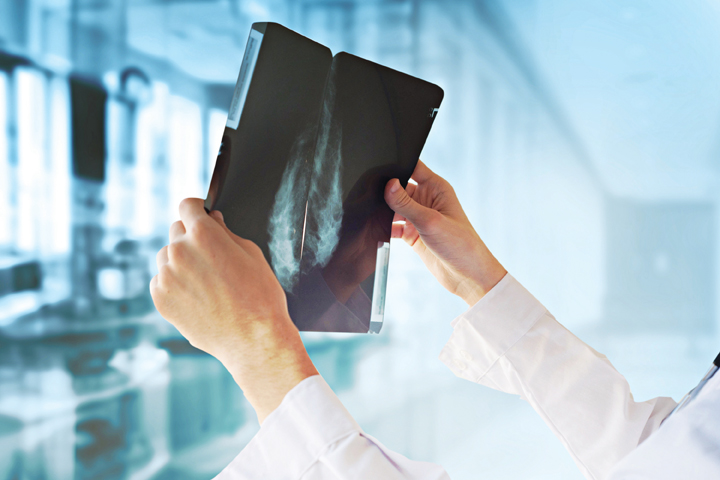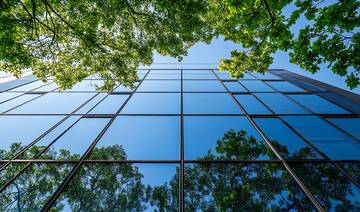DUBAI: Doctors are calling for a national breast cancer screening program targeting all women in Saudi Arabia over the age of 40 to give women a greater chance of survival.
While cancer is one of the biggest killers of women in the Middle East — and breast cancer is the most commonly diagnosed form of the disease — experts say, at present, just ad-hoc “opportunistic” screening exists in the Kingdom.
“There is no organized screening program in Saudi Arabia,” said Professor Fatma Al-Mulhim, consultant radiologist and head of the breast unit at King Fahd Hospital of the University (KFHU) in Khobar and founder of the Breast Cancer Early Diagnosis Committee. “At present screening is opportunistic, which means ladies are not invited to come to regular organized screenings; they come upon their own will. So the uptake of screening and regular checkups is far below international numbers.”
She believes fewer than 20 per cent of women who should be screened are attending routine health checks for breast cancer.
“This reflects a very low number,” she said. “For us, in the Eastern Province of Saudi Arabia, this is our 10th year to host educational campaigns across the city in addition to offering screening through mobile units belonging to charity organizations, government hospitals and the Ministry of Health, among others.
 “I do believe if there are no official programs then the uptake of screening will still be low, because you cannot continue to leave this as an option for ladies.
“I do believe if there are no official programs then the uptake of screening will still be low, because you cannot continue to leave this as an option for ladies.
“We still need to do a lot of work to educate women, as well as encouraging doctors, mainly in the primary care sector, to educate their patients and to send them to send them for screening after the age of 40.”
According to Susan G. Komen for the Cure, the largest breast cancer organization in the US, while breast cancer is the most common cancer and the leading cause of cancer death among women in Saudi Arabia, many of those affected do not seek medical care immediately. As a result, women across the region are often diagnosed with breast cancer at a late stage, when there are fewer treatment options and outcomes are worse.
Rola Shaheen, medical director and chief of radiology at Peterborough Regional Health Center in Ontario, Canada, is working alongside Professor Al-Mulhim and fellow experts across the Kingdom to examine breast cancer awareness and protocols for screening across the country as part of an ongoing study titled “Comparative Baseline Needs Assessment for Breast Cancer Awareness and Management in the Middle East and North Africa.”
She too believes an organized population-based screening program is better than the current “opportunistic” approach both in Saudi Arabia and the wider Middle East.
“Population-based screening is offered systematically to all individuals in a defined target group with a framework of agreed policy, protocols, quality management, monitoring and evaluation while opportunistic breast screening is offered to an individual without symptoms when she presents with healthcare provider for reason unrelated to that disease,” she said. “So almost all the breast screening taking place in the Middle East is falling under the opportunistic part, including Saudi Arabia.
“While I agree that opportunistic screening is an important step towards fighting breast cancer and helps with early detection and down-staging of the disease, I think it should be offered hand-in-hand within a framework of quality programs to protect women and ensure appropriate high-quality care.
“The population-based/organized screening would be ideal if the resources are available, and in a country like Saudi Arabia, I would think they are probably ready to step into this big commitment.
“Basically, the advantages are low-lying fruits at this point.”
Shaheen said an organized national screening programme would “bridge the gaps between the “fragmented efforts” currently in place.
“I would also recommend involving behavioral experts in the population-organized programs to understand within the local settings and cultural norms how to communicate with patients and disseminate invitations and results to women and their doctors.”
The call comes during Breast Cancer Awareness Month, 31 days of charity and campaigning for global breast cancer charities and organizations. <br/>

Early detection is key in order to improve chances of survival. If breast cancer is detected at Stage 1, the chances of survival are
95-100 percent. This compares to 57 percent if detected at Stage 3.
The number of people around the world who have cancer is “rapidly growing,” with 18.1 million new cases and 9.6 million deaths in 2018 alone, according to a report released last month by the World’s Health Organization’s International Agency for Research on Cancer.
By the end of the century, cancer will be the No. 1 killer globally and the single biggest barrier to increasing our life expectancy. Breast cancer is one of the top three most common cancers worldwide.
So far in 2018, it is estimated that 627,000 women have died from breast cancer across the globe, which is about 15 percent of all cancer-related deaths among women.
Dr. Aref Hammam, a consultant in general surgery at UAE’s Bareen International Hospital, said breast cancer is a growing condition with women in the region.
“However, many women identify the condition only at an advanced stage,” he said.
Dr. Nazura Siddiqi, a specialist in obstetrics and gynaecology at the hospital, said breast cancer has four stages, defined by the prevalence and size of the tumor. The chances of survival are between 95 to 100 percent if the breast cancer is detected at Stage 1. But if the condition is detected at Stage 2, the survival chance decreases to 86 percent. If breast cancer is detected at Stage 3, the survival rate goes down to 57 percent.
These figures, she said, underline the importance of screening and early detection in order to improve the chances of survival. Aside from age, gender, and family history, prolonged exposure to estrogen, in various forms, can also increase the risk of breast cancer in women.
Those who began menstruating at an early age (below 13 years), those who have not given birth, those who have not breastfed, those who had their first child after age 30, those who have used oral contraceptives, those who had late menopause (after age 50), and those who have used hormone replacement therapy also have higher chance of developing breast cancer.
“Unhealthy lifestyle choices — drinking alcohol, smoking, physical inactivity, obesity and unhealthy food preferences such as fast food and processed food — also significantly contribute in increasing the risk of having breast cancer. It is strongly recommended that women who belong to any of these categories to be proactive about regular screenings,” added Dr. Siddiqi.
“Early detection is the key.”














